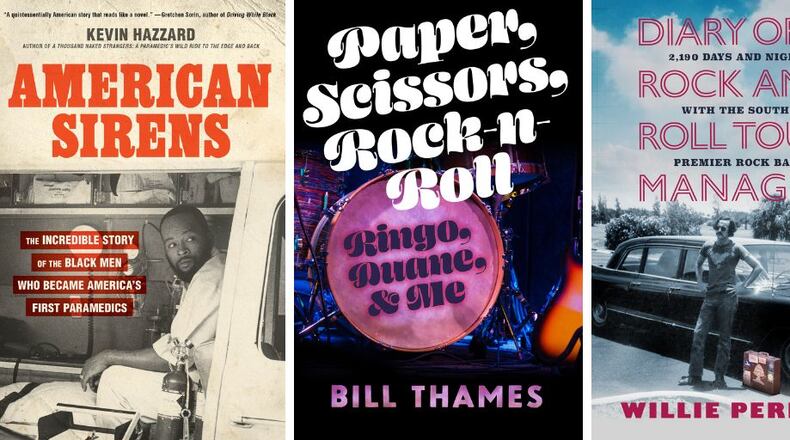This week’s Bookshelf is about three books published this month, one a hidden history about the country’s first paramedics, and two about Georgia’s favorite Southern rock band, the Allman Brothers Band.
Safety first: Paramedics have become such an essential part of our public health care system that it’s hard to imagine a time when they didn’t exist. In truth, police were the ones tasked with administering to people in a medical crisis and delivering them to the ER until the late ‘60s when a Pittsburgh organization called Freedom House created the first ambulance service with trained paramedics.
“They succeeded, wildly. Paramedicine as they practiced it — practically invented it — worked; it saved lives. It became a fixture, spawned a subculture, inspired a hit TV show. It was the rare innovation so intuitive and obvious that in hindsight no one could imagine or even remember a life without it,” writes Atlanta author Kevin Hazzard in his new book, “American Sirens: The Incredible Story of the Black Men Who Became America’s First Paramedics” (Hachette Books, $30).
Despite the success of Freedom House, those pioneers of what quickly became an essential public service battled racism every step of the way. Ultimately, the experience did not end well for everyone.
Hazzard knows a thing or two about this topic. He was an EMT in Atlanta for 10 years and is the author of the 2015 memoir “A Thousand Naked Strangers: A Paramedic’s Wild Ride to the Edge and Back.”
For “American Sirens,” Hazzard’s narrative focuses on three people. The most fascinating one is John Moon, a Grady baby born in 1949 who grew up in the impoverished neighborhood of Buttermilk Bottom. When he was 7, he was sent to live in the Carrie Steele-Pitts Home orphanage with his sister, June, after his mother died. For the first time, John attended school, wore shoes and wasn’t hungry. When John was 14, the siblings were adopted by a relative in Pittsburgh, and he would grow up to join Freedom House and become one of the first paramedics.
The book also tells the story of Dr. Peter Safar, one of the doctors credited with inventing CPR and the person who conceived of Freedom House, and Dr. Nancy Caroline, who managed the ambulance service and created an instruction program that became the model for paramedic training nationwide. Together their narratives tell an engrossing story about innovation, heroism, public health and systemic racism.
Hazzard and Moon will be in conversation together for an author event at 7 p.m. Wednesday, Sept. 21, at the Jimmy Carter Presidential Library. Presented by Acappella Books, the event is free. For details go to acappellabooks.com.
Ramblin’ man: Willie Perkins kicks off his new memoir “Diary of a Rock and Roll Tour Manager” (Mercer University Press, $25) with a heck of a story about how he came to land the job as tour manager for the Allman Brothers Band in 1970.
The Augusta native, who had earned a degree in business administration from the University of Georgia, was working as an auditor and fraud investigator for an Atlanta bank when he became a fan of the then little-known rock band. Having befriended the band’s tour manager Twiggs Lyndon, Perkins expressed interest in hiring on with the crew in whatever capacity possible. Soon after, Lyndon got into an altercation with a club owner in Buffalo, New York, over the band’s pay and stabbed the man to death. Enter Willie Perkins as the new tour manager for the next six years.
Sectioned by years and written like journal entries listed in chronological order by venue, this book is for the superfan who’s into the band’s minutia. There’s not a lot of detail about life on the road or the shows. Perkins seems more interested in charting the growth of the band’s earning power from $500 to $10,000 to $15,000 to $25,000 a gig.
The book is illustrated with photographs of contracts, concert posters, tickets and photographs of The Starship, a private Boeing 720 commercial airliner tricked out with a bar, bedroom, shower, sofas, organ and fake fireplace that the band used regularly in 1973-74.
As for the fate of Twiggs Lyndon, the band’s tour manager who killed a man? He had a non-jury trial and was found not guilty by reason of insanity by a judge and sent to a mental institution. A year later, he was back with the band as stage manager.
In the beginning: For more personal insight into Gregg and Duane Allman, there’s Bill Thames’ effusive memoir, “Paper, Scissors, Rock-n-Roll” (Mercer University Press, $28). Thames befriended the brothers and jammed with them on occasion when there were all teenagers, playing in rock bands in Daytona Beach, Florida. The memoir spans that brief era in the ‘60s when they were just young pups finding their way.
“We could feel that Duane and Gregg were on the brink of launching themselves into stardom, and it became more apparent every time they walked out on a local stage,” writes Thames.
Suzanne Van Atten is a book critic and contributing editor to The Atlanta Journal-Constitution. Contact her at svanatten@ajc.com, and follow her on Twitter at @svanatten.
About the Author
The Latest
Featured


